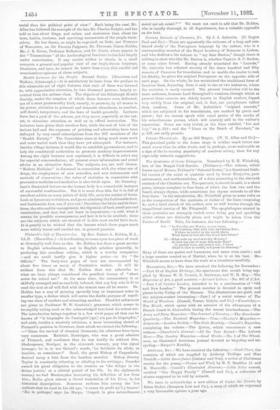Plutarch's Life of Thernistocles. By Rev. Hubert A. Holden, M.A
, LL.D. (Macmillan.)—It is refreshing to come upon to a piece of work NO thoroughly well done as this. Dr. Holden has done a great service to English schoolmasters, and to English scholars generally, in producing this exoellent edition, which is a worthy companion —and we could hardly give it higher praise—to his " De Officiis." The forty-two pages of text are accompanied by about five times as many of illustrative matter. It will be evident from this that Dr. Holden does not subscribe to what we have always considered the pestilent heresy of "short notes for school use." At the same time, the commentary is so skilfully arranged and so carefully indexed, that any boy who is fit to read the text at all will find with the utmost ease all he wants. Dr. Holden has a way of printing specially long or important notes in smaller type, a device which will serve the double purpose of repell- ing one class of readers and attracting another. Plentiful references are given to Professor W. W. Goodwin's grammar, which seems to be rapidly taking rank as the acknowledged text.book for school use. The introduction brings together in a few vivid pages all that can be known of "he biographe de rantiquit6 [qui] n'a pas do biographic," and adds, besides a masterly criticism, a most interesting sketch of Plutarch's position in literature, from which we extract the following : —" Since the revival of classical literature, his admirers have been very numerous. Rabelais, Montaigne, who was a great admirer of Plutarch, and confesses that he can hardly do without him, Shakespeare, Scaliger, in the sixteenth century, pay him signal homage ; he is, to use Graard's words, `Le breviaire du siksle, sa lumiere, ea conscience ?' Basil, the great Bishop of Cappadocia, derived many a hint from tho heathen moralist. Bishop Jeremy Taylor is constantly referring or alluding to his writings ; Noander owned his great obligation to the treatise on the delays in the divine justice,' at a critical period of his life. In the eighteenth eentury we find Montesquieu borrowing his definition of law from him ; Rollin gives almost a literal translation of his Lives, in his historical descriptions. Rousseau reckons him among the few authors that he read in his old age, 'It cause du profit qu'il y truuve.' 'He is perhaps,' says La Harpo, resprit le plus naturellement
moral qui sit exist6 ?' " We must not omit to add that Dr. Holden, who is equally thorough in all departments, has a valuable appendix on tho text.






































 Previous page
Previous page